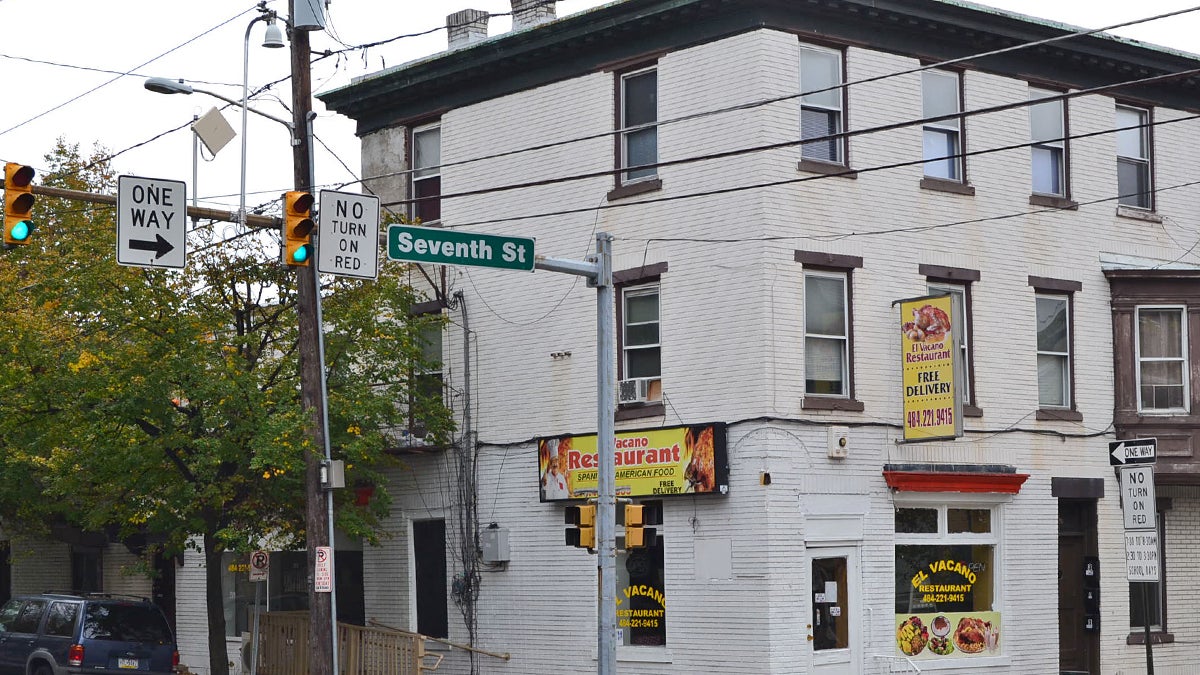Sign of the times: Allentown debates Spanish-language street signs

Allentown's Seventh Street has many Latino-owned businesses
Allentown city councilman wants Seventh Street co-branded as “Calle Siete.”
Driving into Allentown, you’re likely to spend at least some time on Seventh Street, one of the city’s main drags. The street’s shops, businesses and restaurants are diverse, but there’s a distinctly Latin flair to the area. That’s not surprising, considering about half of city residents are Hispanic.
In honor of the Latino-owned businesses that have helped to revitalize Seventh Street, a city councilman has proposed co-branding the street “Calle Siete,” or Seventh Street in Spanish. Julio Guridy, one of two Latinos on Allentown’s seven-member city council, wanted an additional street sign hung above or below the official Seventh Street signs, bearing the Spanish translation.
What he got instead was a whole lot of community response, most of it negative toward the idea.
Honoring Hispanic influence?
Despite making up the largest single ethnic group in the city, Hispanics still represent a minority in city leadership roles and civil service, like the police force. One of Allentown School District’s elementary schools is named after an Hispanic leader, but that’s about it.
Guridy told the Associated Press that the street sign idea was to “provide a sense of pride, and a sense of belonging, to the Hispanic community, who have been working hard and contributing to this community, and who feel alienated because they are not recognized for their contributions.”
But many Latino business owners on Seventh Street felt that Guridy was missing the point by fighting for bilingual street signs.
John Rosario, owner of an insurance agency on Seventh Street, asked the Allentown Morning Call, “How are these signs going to help anybody? Street signs in Spanish, English or German aren’t going to make a difference in this community. That’s not what we need.” He added that city council should “spend their time thinking about things that would be more meaningful to the community.”
For Rosario, that includes issues like lack of customer parking and litter. Rosario says he and the other business owners were not contacted by Guridy before the street sign initiative was proposed.
Reopening old wounds
Sure, the city could be focusing on bigger issues, but are bilingual street signs really harming anyone? Some Allentown residents say, emphatically, yes.
Bill White, a columnist for the Allentown Morning Call, says this initiative isn’t going to heal any community divides. Rather, he worries about the old demons it’s bringing up for the city.
“Allentown has kind of an unfortunate tradition going back some years to the 80s, where there was a lot of resentment against Hispanics coming into the community,” said White, who wrote a column opposing the ordinance. “It was an ugly situation, and one of the reasons that I opposed this was that I knew it was going to rekindle a lot of that stuff.”
In the 1990s, the city did try to pass an English-only ordinance that prohibited the printing of city materials in any language other than English. Based on emails White has received, as well as letters to the editor and online comments that he’s seen, White says that sentiment still exists in Allentown. It’s just been fairly quiet recently.
But now, in light of this new proposal, anti-Hispanic rhetoric has come out of the woodwork once more. White felt he had to write a follow-up column separating his opposition to the street sign proposal from opposition to the Hispanic community as a whole.
“It’s worth pointing out that English as a Second Language classes have waiting lists, and most people are trying to learn English,” said White. “And when this city was built by German immigrants, there were German newspapers, it was spoken from the pulpits and you can still see German influence reflected in street names and places across the city.”
Like many people who attended the city council meeting where this issue was discussed, White thinks there are ways to honor Hispanic leaders without rebranding the city’s main shopping district. He’d like to see a park named after an Hispanic leader, for example.
Not newcomers, but First Nations
Allentown isn’t the first city to consider this type of move. Guridy got the idea from parts of Philadelphia where street signs bear multiple translations and Miami, where Southwest 8th Street, in Little Havana, is generally referred to as Calle Ocho.
But other cities are using bilingual signs to honor not newcomers, but the oldest residents of the city: indigenous people. In Toronto, an activist group called Ogimaa Mikana started dotting the city with bumper stickers bearing Anishinaabe translations of street signs. The Anishinaabe tribe once stretched along the Canada-U.S. border from North Dakota to Ohio, according to NPR.
After three years of guerrila translations, the city of Toronto and some business development groups reached out to help make it official. In September, the first bilingual street signs went up in the city.
Hayden King, co-founder of Ogimaa Mikana, told PRI, “We didn’t believe it would happen at first. I think they wanted to acknowledge indigenous history, and we’re in this era of supposed reconciliation in Canada. I got to give them a lot of credit.”
Honoring the past, looking ahead
Some Allentown residents want to see similar respect offered to the city’s original immigrants, the Germans, Poles and Italians who built the city in the 1800s. One solution floated at the city council meeting was to hang signs translating Seventh Street into multiple languages, honoring multiple groups.
None of these alternate suggestions were adopted, but neither was Guridy’s original “Calle Siete” proposal. Allentown’s Public Works Committee, which gets first say on the matter, voted to table the question for at least the a month.
WHYY is your source for fact-based, in-depth journalism and information. As a nonprofit organization, we rely on financial support from readers like you. Please give today.


